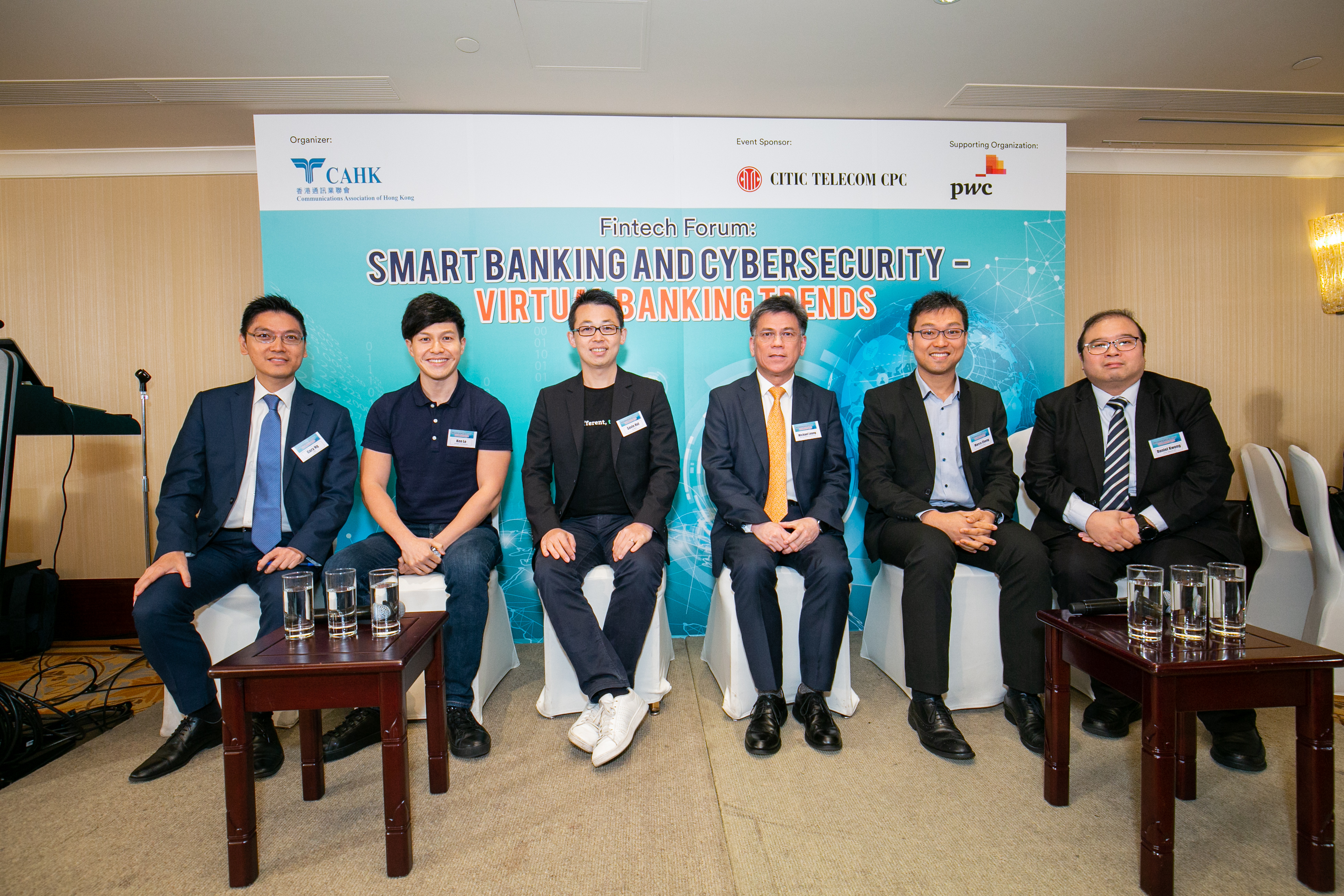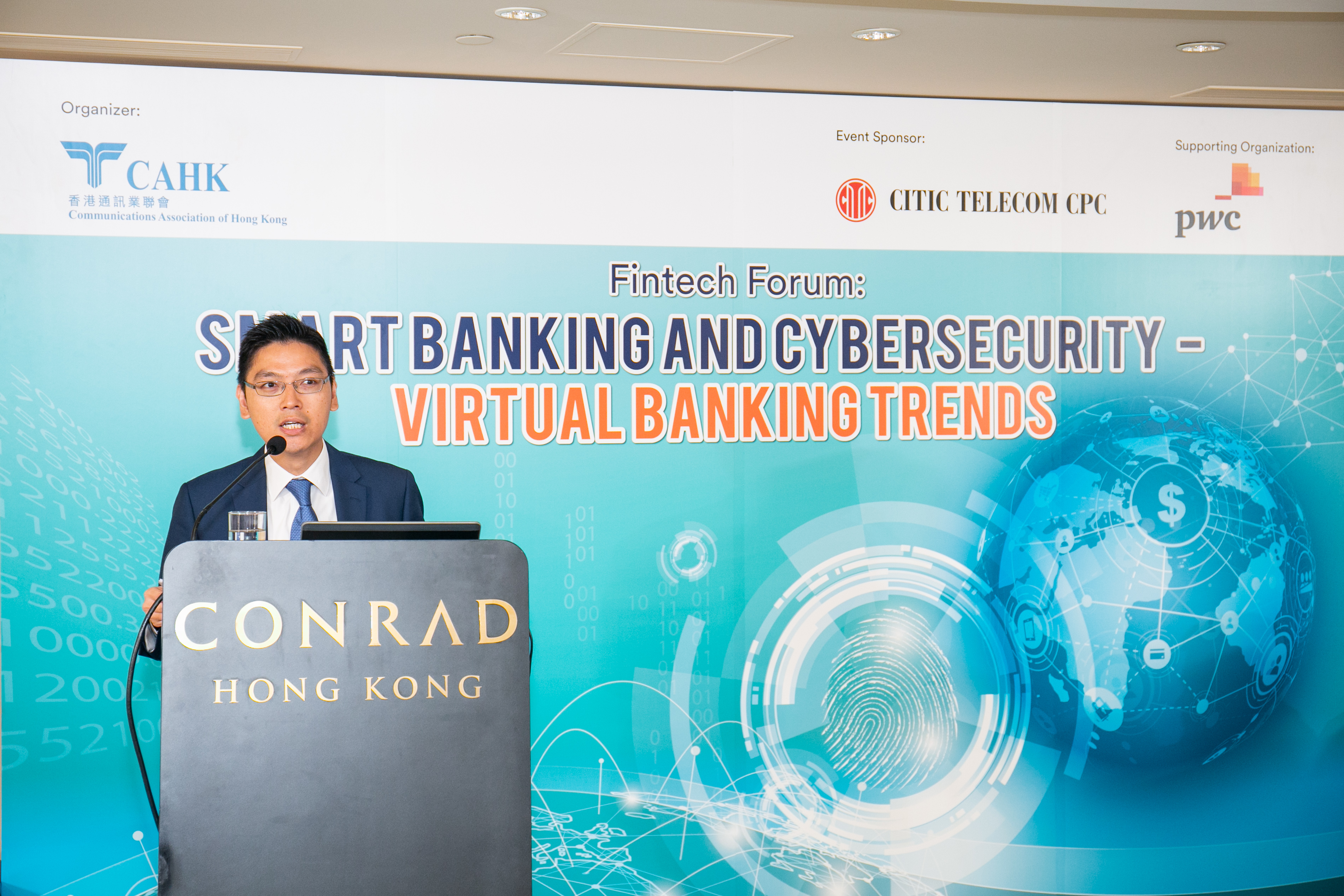Virtual banking – how we embrace it whilst managing the security risks behind?
Experts in the Banking & Finance and Information Security sector converged at the Communications Association of Hong Kong’s Fintech Forum luncheon, sponsored by CITIC Telecom CPC, to explore the hot topic.
![虚拟银行 – 如何抓緊虚拟银行发展机遇同时管理背后风险? (仅限英文版)]()
Technology and banking experts attended CITIC Telecom CPC’s exclusive luncheon and panel discussion for the hot topic of virtual banking. (From left) Gary Ng, Ken Lo, Savio Hui, Michael Leung, Marco Cheng, Daniel Kwong.
Experts in the Banking & Finance and Information Security sector converged at the Communications Association of Hong Kong’s Fintech Forum luncheon, sponsored by CITIC Telecom CPC, to explore the hot topic.
In today’s digital age, more and more people are shifting their banking habits and accessing financial services online. In the meantime, with the granting of virtual banking licenses by the Hong Kong Monetary Authority (HKMA) early this year, it marked a new era of banking with new customer experience and financial inclusion. Yet, how does the benefits and challenges weigh with each other, and is it really feasible?
![虚拟银行 – 如何抓緊虚拟银行发展机遇同时管理背后风险? (仅限英文版)]()
Kick starting the luncheon, Gary Ng, Financial Service Partner, PwC, explores the massive potential of virtual banking. “A ‘virtual bank’ primarily delivers its services online without the presence of physical branches. This requires virtual banks to engage their customers in an entirely different way,” says Ng. “A successful virtual bank often excel at customer centricity, and have an agile and creative operating model. This allows it to give customers great efficiency and convenience in their virtual banking experience which they value the most.”
![虚拟银行 – 如何抓緊虚拟银行发展机遇同时管理背后风险? (仅限英文版)]()
Next, Michael Leung, MH, Group Chief Executive Officer, BOA International Financial Group, looks at the opportunities versus the challenges which virtual banking presents. “Hong Kong has an extremely congested banking industry, in such a small city, there are already over 150 banks,” says Leung. “The key to the future success of the virtual banking is to make the pie bigger. While virtual banking provides a more fit-for-purpose and cost efficient model, there are also great risks which need to overcome including a lack of confidence and trust due to no physical branches presence and personal contact as well as talent shortage when it comes to acquiring IT banking and compliance expertise.”
In the panel discussion during the luncheon, more IT and financial experts joined to debate the viability of virtual banking in Hong Kong. “Virtual banking is not completely new. Banks from all around the world are trying to provide their services digitally today,” says Ken Lo, Head of Strategic Partnership, ZhongAn International. “The key is to provide a seamless customer journey. For this to happen, cooperation between banks and fin-tech companies is crucial in the future.”
For Marco Cheng, Head of Technology Risk Management, Livi VB Ltd., integration with ecosystem is crucial for virtual banking. “In today’s digital world, customers, especially new generation or digital savvy, are looking for much more than the fulfillment of basic needs. There has to be a dedicated business model that is tailored for them like smart and simple UX/UI design, to enhance customer experience as much as possible.”
Being such a new digital based platform, virtual banking has many potential technical hurdles to overcome. “As a new model in Hong Kong, virtual banking has many security issues which need to be aware of” says Savio Hui, Head of Technology Risk & Cyber Resilience, ZA Bank Ltd. “Aside from being beneficial to customers, virtual banking must also be respectful of customer data. How it is stored and used must be paid great diligence.”
![虚拟银行 – 如何抓緊虚拟银行发展机遇同时管理背后风险? (仅限英文版)]()
An expert in the Information Security Services & Data Science field, Daniel Kwong, Chief Information & Innovation Officer, CITIC Telecom CPC, concurs deeply.“In launching virtual banking, cyber attacks may occur during onboarding and authentication. Incidents that occur in Faster Payment System (FPS) and Electronic Direct Debit Authorization (eDDA) were due to a lack of proper authentication and onboarding. Problems arise when new technologies meet old processes,” says Kwong.
“Apart from considering to adopt super-authority and real name authentication, the banking & finance industry should also urge for a better validation flow with the government authority. I think Hong Kong should try to adopt the ways of virtual authentication that China is practicing, such as the China RFID-based NCIIC China-ID and facial similarity comparison service by the Ministry of Public Safety which greatly decreased incident rate after implementation,” concludes Kwong.







